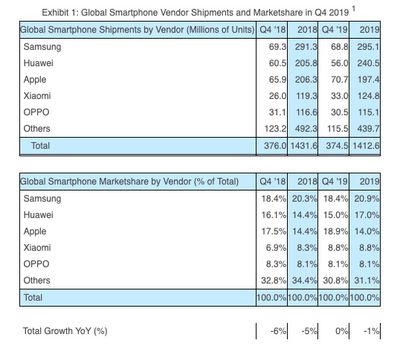Apple matched or overtook Samsung to become the world's biggest smartphone maker in the fourth quarter of 2019, according to new data from market tracking firms.
A new report by Strategy Analytics put Apple's iPhone shipments for the fourth quarter of last year at 70.7 million units, slightly ahead of Samsung's estimated 68.8 million.

Apple grabbed first position with 19 percent global smartphone marketshare, while Samsung claimed second position, staying flat at 18 percent. Huawei dipped to 15 percent share in third place. Full-year smartphone shipments totaled 1.4 billion units in 2019, according to Strategy Analytics.
"Apple iPhone shipments rose 7 percent annually from 65.9 million units worldwide in Q4 2018 to 70.7 million in Q4 2019. This was Apple's best growth performance since 2015. Apple's global smartphone marketshare has lifted from 18 percent to 19 percent in the past year. Apple is recovering, due to cheaper iPhone 11 pricing and healthier demand in Asia and North America."
Research firms are forced to estimate global smartphone sales because Apple stopped providing its own iPhone figures in January 2019, while Samsung gives a total number that includes smartphones and feature phones.
As a result, there are inconsistencies between market researchers' data. For example, IHS Markit have the positions of the two biggest players flipped, with Samsung at 70.7 million and Apple at 67.7 million. As Bloomberg notes, the consensus is that there's essentially no longer any daylight between the two dominant brands in mobile phones.
Apple's approximate tie with Samsung is due to a recent surge in iPhone sales, which brought in $56 billion in revenue for 8 percent growth during the December quarter, according to the company's latest financial results.
The iPhone 11 was the top-selling iPhone every week during the quarter, and the three new iPhone models were Apple's most popular iPhones. The company reported $22.2 billion in profit on $91.8 billion revenue, making the last quarter the best in Apple's history in terms of revenue and profit, topping the first fiscal quarter of 2018.
Meanwhile, Samsung this week reported a 38 percent decline in profit. The Korean company saw a boost in its mobile business, but it wasn't enough to offset declines in its component operations, mainly due to falling memory chip prices.
Samsung's mobile business increased 67 percent to $2.13 billion, while its revenue increased 7 percent to $21.1 billion. But soft demand in its display business and sliding LCD prices saw its operating profit slump 57 percent, while revenue dropped 11 percent.
Looking at the broader picture, IHS Markit's figures suggest Samsung shipped significantly more smartphones than Apple over the whole of last year – 295 million in total, compared to Apple's 193 million.
According to Strategy Analytics, so did Huawei – the Chinese manufacturer reportedly shipped around 240 million phones, allowing it to overtake Apple and become the world's second best-selling smartphone manufacturer in 2019.





















